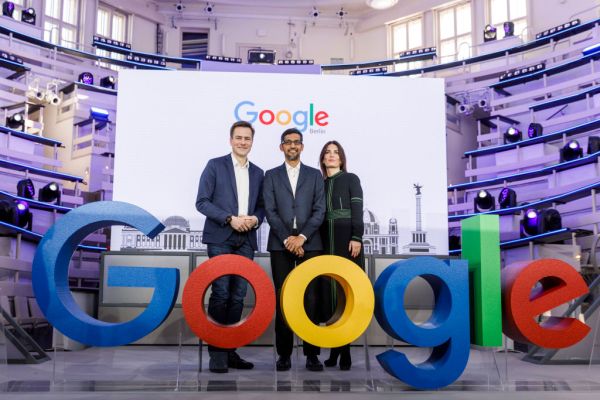In a decision as significant as it is unsurprising, Germany’s antitrust regulator has concluded that Google’s business meets the threshold for special abuse control which was established under an update to competition law targeted at digital giants and passed at the start of last year.
The finding that Google has “paramount significance across markets” is the first such decision taken by Germany’s Federal Cartel Office (aka the Bundeskartellamt) — which has ongoing procedures assessing the same vis-à-vis the market power of Amazon, Apple and Meta/Facebook — and it stands for five years, paving the way for antitrust interventions which could prefigure incoming pan-EU ex ante rules also targeting tech giants’ overbearing market power (aka, the Digital Markets Act).
“The Bundeskartellamt holds that Google is of paramount significance for competition across markets within the meaning of Section 19a(1) GWB [Gesetz gegen Wettbewerbsbeschränkungen; aka the German Act Against Restraints of Competition]. The company has an economic position of power which gives rise to a scope of action across markets that is insufficiently controlled by competition,” the FCO writes in a press release today.
The regulator says its assessment factored in Google’s dominant market share of general search (80%+ in Germany); its market power in online advertising; its intermediating role as a gatekeeper of key services like YouTube and the Play Store on Android (which the FCO likens to “infrastructure”); its access to data as a result of holding so much market power — enabling it to further stoke competitive advantage via ad targeting and product development; and its market capitalization, which the regulator notes is “one of the highest worldwide and reflects Google’s large financial power”.
“The competitive advantage resulting from this access to data and other resources, such as the ‘Google’ brand, can be used as shareable inputs in many ways across markets,” it added. “This makes it easier to operate, improve and expand existing services or develop entirely new ones.”
The Bundeskartellamt has two investigations in train related to Google’s business — one examining its data terms and another looking at its News Showcase content licensing deals with publishers — both of which were initiated last year.
Now that it has determined Google is subject to extended abuse controls these probes take on added significance — as the FCO will be able to immediately intervene against any anti-competitive behavior it identifies.
Having worked on all these procedures in parallel the regulator can — in theory — shrink the time frame needed to take action against Google. Although it has not provided any steer on when the two investigations might produce conclusions and actions as yet.
Commenting in a statement, Andreas Mundt, president of the Bundeskartellamt, said: Since January 2021 we have a new instrument to monitor large digital companies. In less than a year, we have now taken the first official decision based on this provision and determined that Google is of paramount significance across markets. This is a very important step since based on this decision the Bundeskartellamt can now take action against specific anti-competitive practices by Google. We have already started to look into Google’s processing of personal data and to deal with the Google News Showcase issue in more detail. At the same time, we are vigorously conducting other proceedings against Amazon, Apple and Meta, formerly Facebook.
Google has been contacted for comment on the FCO’s finding of its paramount market significance.
Update: A Google spokesperson said:
People who use our products and services expect that we operate a responsible business, and that we are regulated. We are confident that we comply with the rules and, to the extent that changes are necessary, we will continue to work constructively with the FCO to find solutions that enable people and businesses in Germany to continue to use our products.
Per the FCO, Google is not appealing the decision — nor will it “deny its status as norm addressee within the meaning of Section 19a(1) GWB” — however the regulator noted that that does not mean the tech giant “necessarily agrees with all the facts as established by the authority in its decision and the conclusions drawn from these facts”.
While pan-EU rules targeting tech giants are still in the process of being agreed and adopted — so likely a couple of years out — individual countries in the region are not waiting around for the bloc to update its rules.
France’s competition watchdog, for example, has already intervened in how Google cuts deals with local publishers — off the back of a pan-EU digital copyright reform that was quickly transposed into local law.
Germany’s FCO seems likely to follow with interventions this year too.
The U.K., meanwhile, also has its own “pro-competition” reforms in train — which will see it apply bespoke rules to the most powerful tech platforms one the government passes the necessary legislation.
A Digital Markets Unit, which sits within the Competition and Markets Authority (CMA) and will oversee application of the incoming regime, already got up and running last year.
The CMA isn’t standing still in the meanwhile — with a number of big tech investigations on its plate, including a major intervention examining Google’s Privacy Sandbox proposal to deprecate third-party tracking cookies and a probe of Apple’s App Store rules.
Late last year the CMA also ordered Meta/Facebook to undo its acquisition of Giphy.
So the age of tech giants operating with a very long rope to do as they please — which for years even included getting to choose their own antitrust remedies (!), in the case of Google and the EU — is finally, firmly on the wane in Europe.
